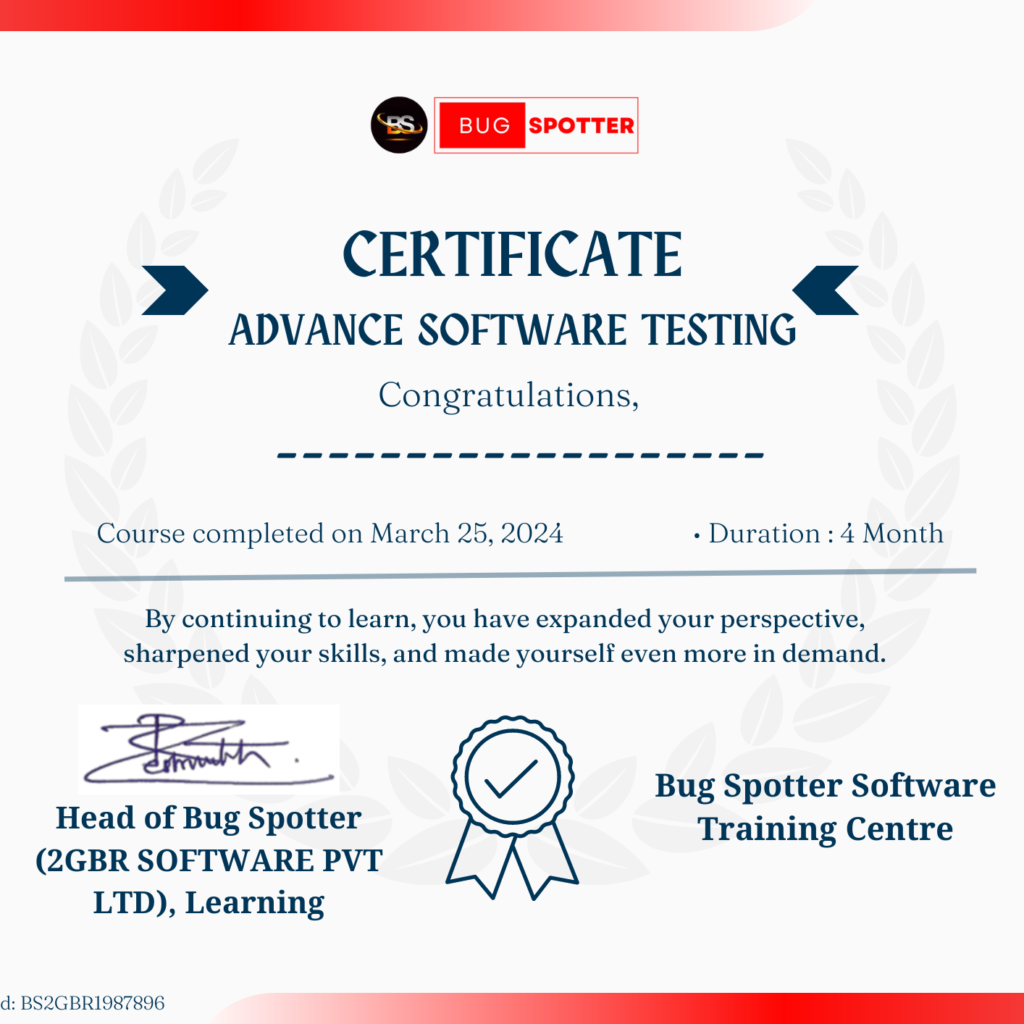Best Software Testing Course In Aurangabad with 100% Placement
100% Placement Assistance | Live Online Sessions
1000+
Students Trained
100%
Placement Assistance
07 December, 2024
Start Date
0%
EMI Available
7:30 AM - 9:30 AM
Lecture Timings ( IST )
Term 1
In this term, you will learn basics of software testing and how to ace Models, Ceremonies,Testing Terminologies, etc…
- Introduction
- Software
- Software Testing
- SQA
- SDLC (Software Development Life Cycle)
- SDLC Models:
- Fish Model
- Waterfall Model
- V-Model
- Agile Model
- Agile Ceremonies:
- Daily Scrum Meeting
- Backlog Grooming Meeting
- Sprint Planning Meeting
- Sprint Retrospective Meeting
- Functional Testing
- Non-Functional Testing
- UAT Testing
- Priority & Severity
- Testing Terminologies
Term 2
In this term, you will learn how to ace Test Plans, Methodologies, Tools, etc…
Module 2: Advanced Part
- Test Plan
- Test Methodology
- STLC (Software Testing Life Cycle)
- Bug Life Cycle
- Test Case Design
- Bug Tracking Tool: JIRA
- Accessibility Testing Tool: NVDA
- Performance Testing Tool: J-Meter
- Mobile Testing
- Real Time Interview Questions
Basic of SQL :
- Downloading & Installation of Oracle
- Data Base
- DML Commands
- DDL Commands
- SQL Constrains
- Aggregate Functions
- SQL JOINS
Term 3
In this term, you will learn how to ace Api testing and industry projects
Module 4
Basic :
- Idea of API & API Testing
- Basic Idea of POSTMAN Tool
HTTP Methods :
- GET
- POST
- PUT
- PATCH
- DELETE
HTTP Status Codes :
Practical Demo of API Testing :
Module 5: Core Java
- Basics of Java:
- What is Java
- Data Type
- Variable
- Operators
- Control Statement:
- Conditional Statement
- Jump Statement
- Looping Statement
- Methods (Functions)
- Constructors
- OOPS Concept:
- Inheritance
- Polymorphism
- Encapsulation
- Abstraction
- Access Modifiers
- Advanced Part:
- String Class & Its Methods
- Array
- Collection
- Logical Program
- Pattern Program
Module 6: Selenium WebDriver
- Basics of Selenium WebDriver:
- What is Selenium?
- Introduction to Selenium and Automation Testing
- Selenium Architecture
- How to Download and Install Selenium WebDriver
- What is WebDriver and WebElement and Its Methods?
- First Automation Script
- Locators in Selenium
- XPath Locators and Its Types
- FindElement() and FindElements() Methods
Module 7: Framework and DevOps
- Actions on WebElement and TestNG:
- How to Select DropDown from Selenium WebDriver
- How to Take Screenshot in Selenium WebDriver
- Actions Class in Selenium
- Selenium Waits
- Popup Handling in Selenium
- How to Handle Iframe
- Read and Write Excel Data
- How to Download and Install TestNG
- TestNG Annotations, Keywords
- Cross Browser Testing
- TestNG Groups - Include and Exclude with Example
- xml and Reports
- Page Object Model
- Maven
- BDD Framework
- Git, GitHub
- Jenkins
- Banking Domain
- Telecom Domain
- E-Commerce Domain
- Healthcare Domain
- Technical Doubt Sessions
- Non Technical Doubt Sessions
- Resume Building
- Placement Process
Why software testing course in Bug Spotter?

Daily Doubt Sessions

Daily Mock Tests

Weekly Mock Interview

Alumni Guidence

Resume Preparation

Job Assistance

Expert Trainers

Self Paced Learning

Students Felicitations
Benefits of Our Software Testing Course Certification:
Our Certificate is widely recognized and accepted by leading companies such as Capgemini, Infosys, TCS, Tech Mahindra, and many other top-tier organizations. Earning this certification provides you with a competitive edge and validates your expertise in the field, offering several key benefits:
Benefits of Our Certification:
- Industry Recognition: Gain credibility and recognition from top IT companies.
- Career Advancement: Enhance your job prospects by showcasing specialized skills valued by industry leaders.
- Skill Validation: Prove your technical competence and stay ahead in the competitive job market.
- Better Salary Prospects: Certified professionals are often eligible for higher-paying roles and promotions.
- Networking Opportunities: Join a community of certified professionals and expand your professional network.
- Improved Confidence: Build confidence in your abilities, knowing you have validated knowledge and skills.
Be Certified

Step-by-Step Preparation for Software Testing
Step 1: Start with Manual Testing
Begin with manual testing to understand the basics of the software testing process. Focus on writing test cases, executing them, and reporting bugs. Also, practice SQL for database testing and learn RESTful API testing
Duration: 1.5 months.
Step 2: Learn Core Java Basics
Once you’re comfortable with manual testing, start learning Core Java. Java is essential for automation testing, especially with tools like Selenium, and it helps you understand object-oriented programming (OOP) concepts.
Step 3: Begin Selenium Automation Testing
After covering Java basics, start learning Selenium to automate web testing. Continue to practice Java and OOP alongside Selenium for a stronger foundation in automation.
Duration: 1.5 months.
Step 4: Wrap Up Learning in 3 Months
In total, spend around 3 months to cover manual testing (including SQL and API) and automation testing (Java and Selenium). By this point, you’ll have the skills for both manual and automated testing.
Step 5: Work on a Real-World Project
Apply your skills in a project involving both manual and automated testing. This will give you practical experience and enhance your portfolio, preparing you for real-world testing roles.

What is automation testing Course?
Test automation uses tools and scripts to run tests automatically in software development, instead of doing them by hand. This process involves writing test cases that can run on their own, which helps improve the speed and accuracy of testing. It saves time, reduces human mistakes, and allows for more thorough testing.
why software testing is important?
Software testing is important because it helps find problems or bugs in the code before the product is released to customers. This step is crucial for improving the product’s quality, which directly impacts customer satisfaction and interest. Delivering a high-quality product is a key factor in achieving success.
software testing salary in india?
In India, the average annual salary for software testers is approximately ₹5,25,000, with most salaries ranging from ₹3,56,000 to ₹8,75,000. For software test engineers, the average salary is around ₹6,50,000 per year, with typical salaries falling between ₹4,23,500 and ₹9,54,000.
What is automation testing Course?
Popular software testing tools include Selenium and Appium for automation testing, JUnit and TestNG for unit testing, and Cucumber for behavior-driven development (BDD). Jira is widely used for project management, MySQL for database testing, Postman for API testing, and Eclipse serves as a popular integrated development environment (IDE).
which companies hire software testers
Many companies around the world offer software testing opportunities, including:
- Indian IT Services Companies: Tata Consultancy Services (TCS), Infosys, Wipro, HCL Technologies, Tech Mahindra
- Multinational Corporations (MNCs): IBM, Accenture, Capgemini, Cognizant, DXC Technology
- Product-Based Companies: Google, Microsoft, Amazon, Adobe, Oracle
- E-commerce & Startups: Flipkart, Swiggy, Zomato, Paytm
These companies offer a variety of roles in software testing, ranging from manual to automated testing and more specialized positions.
job openings for software testing
In India, software testing continues to be a booming field, with a steady demand for skilled professionals. Each year, there are an estimated 75,000 to 120,000 job openings in software testing.
Key Factors Driving Demand:
- Growth of the IT Industry: India remains a global IT powerhouse, and ensuring software quality is crucial for delivering top-notch solutions.
- Wide Range of Industries: Job opportunities in software testing are spread across various sectors such as e-commerce, banking, healthcare, telecom, and more, all of which rely on strong testing practices to maintain product quality and security.
Job Roles After Completing a Software Testing Course
- Manual Tester: Responsible for testing software manually to find bugs and issues.
- Automation Tester: Focuses on using automation tools like Selenium, Appium, etc., to run tests.
- Test Engineer: Develops and executes test plans, scripts, and reports to ensure software quality.
- Quality Assurance (QA) Analyst: Ensures the overall quality of the product, from testing to final delivery.
- Performance Tester: Specializes in testing how well the software performs under stress or heavy load.
- API Tester: Focuses on testing the functionality and performance of APIs (Application Programming Interfaces).
- Security Tester: Tests software for vulnerabilities and ensures that security protocols are properly implemented.
- Test Lead/Manager: Manages a team of testers, ensuring that all testing processes are followed correctly.
- Continuous Integration (CI) Tester: Works with CI tools to ensure that new code changes are continuously tested and integrated.
- Test Automation Architect: Designs and implements automated testing strategies for large projects or organizations.
Software Testing Salary in India
| Role | Average Salary (INR) | Salary Range (INR) |
|---|---|---|
| Software Tester | ₹5,25,000 | ₹3,56,000 - ₹8,75,000 |
| Software Test Engineer | ₹6,50,000 | ₹4,23,500 - ₹9,54,000 |
| Test Lead/Manager | ₹9,00,000 | ₹6,50,000 - ₹12,00,000 |
| Automation Tester | ₹6,00,000 | ₹4,00,000 - ₹8,00,000 |


